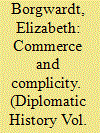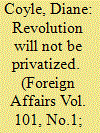| Srl | Item |
| 1 |
ID:
168911


|
|
|
|
|
| Summary/Abstract |
Residents of the Komi Republic have enjoyed some benefits from the oil industry, through taxation, jobs and business opportunities. They have also suffered repeated oil spills, including one of the world's largest in 1994. Since most petroleum taxes go to Moscow for redistribution, the economic benefits are limited, and are focused in urban centres. Rural populations, who suffer most from oil spills, experience benefits primarily through companies’ social projects. We analyse local perceptions of the corporate social responsibility performance of Lukoil-Komi and consider how a weak—or ‘phantom’—social licence to operate can lead to open protest.
|
|
|
|
|
|
|
|
|
|
|
|
|
|
|
|
| 2 |
ID:
098257


|
|
|
| 3 |
ID:
170844


|
|
|
| 4 |
ID:
130983


|
|
|
|
|
| Publication |
2014.
|
| Summary/Abstract |
Many studies have been performed to assess the impacts of corporate social responsibility (CSR) on the financial performance of companies. There are, however, very few studies that analyze how CSR policies and instruments affect the realization of social and environmental CSR goals, such as the reduction of workplace accidents or CO2 emissions. Therefore, it remains uncertain to what extent CSR really contributes to sustainable development and whether it can serve as an alternative to government regulation to internalize external effects from market operation. The present study provides an explorative empirical analysis that aims to fill this gap. We employ regression analysis on a sample of 109 Chinese companies. The estimation results show that having a code of conduct stimulates the implementation of other organizational CSR instruments, but CSR implementation only partly affects the realization of CSR goals. Having codes of conduct without implementing CSR does not have a significant impact on societal welfare.
|
|
|
|
|
|
|
|
|
|
|
|
|
|
|
|
| 5 |
ID:
130982


|
|
|
|
|
| Publication |
2014.
|
| Summary/Abstract |
This study uses an event study methodology to examine how the Chinese market reacts to announcements of involvement in corporate social responsibility (CSR) by Southern Weekend (a Chinese newspaper) for Chinese firms from 2008 to 2012. Our results show significant and positive market reactions, supporting the instrumental stakeholder theory. We attribute the positive market response to social capital development and real growth options related to the CSR involvement by the Chinese firms.
|
|
|
|
|
|
|
|
|
|
|
|
|
|
|
|
| 6 |
ID:
186769


|
|
|
| 7 |
ID:
090653


|
|
|
|
|
| Publication |
2009.
|
| Summary/Abstract |
In today's globalized political economy, diplomacy between nation-states (state-state diplomacy) now exists alongside state-firm diplomacy, the negotiations between multinational corporations (MNCs) and the countries in which they do business. While the state must be committed to the interests of its MNCs in the interest of domestic state-firm diplomacy (maintaining a supportive business environment), it still has recourse to address failures in corporate diplomacy and to maintain the appearance of dominance on the world stage. This paper examined these strategies through a critical analysis of prepared testimony at the February 2006 congressional hearing regarding the controversial actions of four U.S. IT MNCs (Google, Microsoft, Yahoo, and Cisco) operating in China. I conclude that when the government is constrained from using its hard power on its MNCs, soft power becomes its most effective tool. Image, suggestion, and appearance-soft power-can be considered more important than legislation itself-hard power-and perhaps even the currency of current state-firm relations.
|
|
|
|
|
|
|
|
|
|
|
|
|
|
|
|
| 8 |
ID:
071301


|
|
|